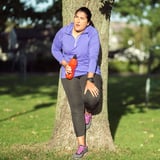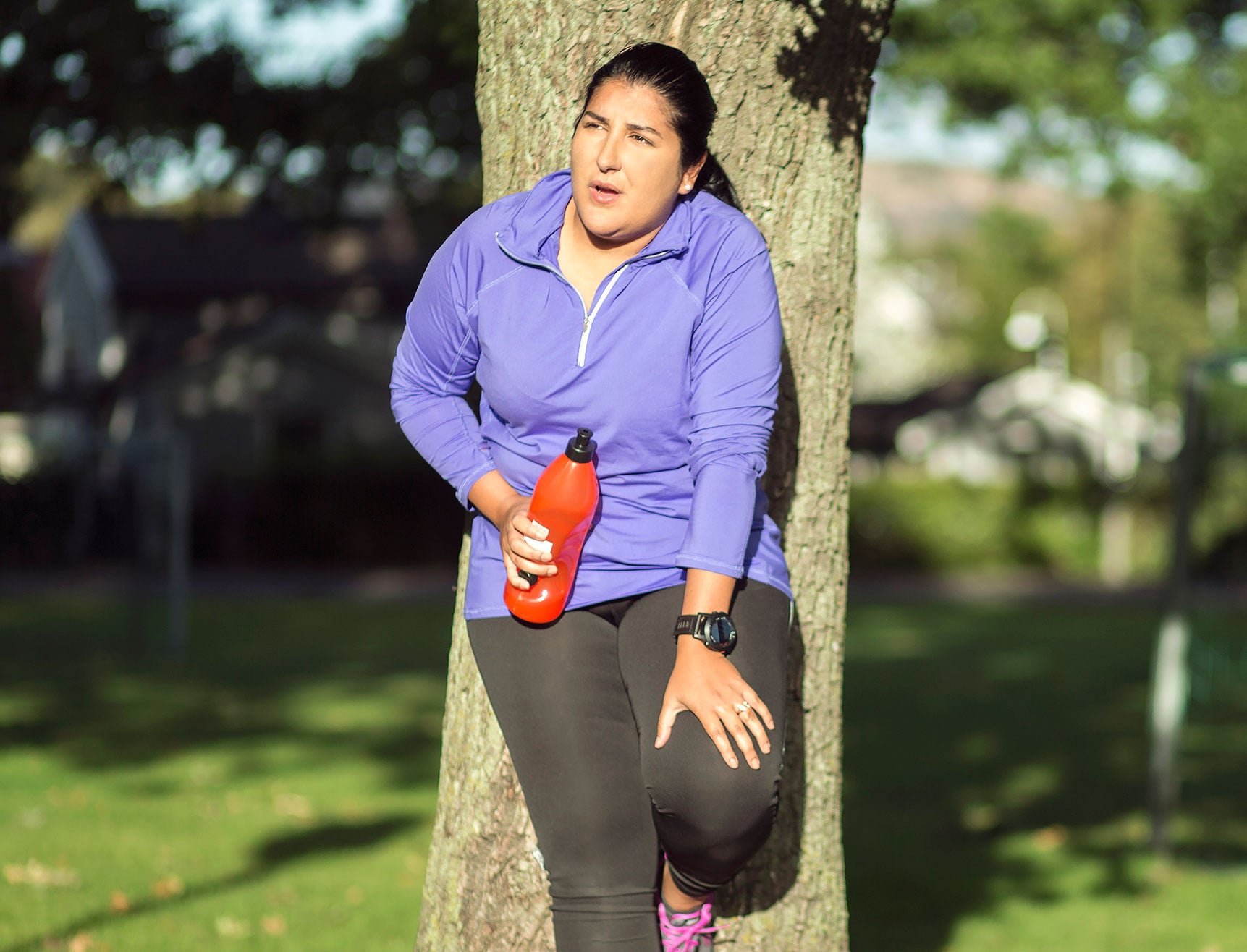

After a grueling CrossFit workout on a hot Summer morning that involved kettlebell swings, goblet squats, and about 100 walking lunges, my lower body was toast. But what was weird was that my left glute started twitching that night and continued into the next day. It didn't hurt at all, but it was annoying! Has your muscle twitched after working out? Here's what you need to know.
What Causes a Muscle Twitch?
A muscle twitch, or sometimes referred to as a fasciculation, is a short, involuntary, unpainful contraction of skeletal muscle that may happen repeatedly, explained orthopedic surgeon Anthony Kouri, MD. Your muscle fibers are controlled by your nerves, and when a nerve fires, it causes movement in the muscle, making it twitch. Muscle twitches can be caused by several factors, and commonly occur after exercise, during periods of stress, when we are sleep deprived, when we consume too much caffeine or other stimulants, or when we're dehydrated.
Why Does My Muscle Twitch After a Workout?
"A muscle twitch often occurs after a hard workout because the muscle has been overworked and there is hyper-excitability of the nerve on the muscle that has broken down from the exercise, and therefore it acts on its own accord," explained Naresh Rao, DO, a sports medicine specialist and head physician for the USA Men's Water Polo Team. If you can see the muscle twitch, it is called a fasciculation. If you can't see the muscle twitch, it is called fibrillation. If it is painful, or more prolonged, then that is a muscle spasm.
Dr. Kouri explained that when we exercise, our muscle fibers become fatigued and we often develop a small imbalance of electrolytes from excessive sweating. Either one of those factors can cause muscle twitching. "A critical electrolyte related to muscle twitches is calcium," said Dr. Kouri, and another is magnesium. Low levels of either mineral can disrupt normal muscle function, leading to twitching. A vitamin D deficiency can also cause muscle twitching, as it's needed to help the body absorb calcium.
Although "electrolyte imbalance and muscle fatigue are the most common causes of muscle twitches," said Dr. Kouri, "dehydration, from any cause, is a common culprit. The majority of muscle weight is water, and any dehydration can also lead to misfiring of muscle fibers."
Aside from keeping our muscles functioning properly, staying hydrated also helps remove byproducts from your body after a strenuous workout, explained Michael Sinel, MD, and assistant clinical professor at the UCLA Department of Medicine. "When you exercise, your body burns glucose as a form of energy, but our bodies can't always keep up with the removal of byproducts such as lactic acid. When too much lactic acid accumulates in the muscles, you will experience burning, twitching, and cramping.
Are Muscle Twitches a Bad Thing?
Most muscle twitches will go away on their own, explained Dr. Rao. "In most scenarios, muscle twitches are harmless and easily remedied," assured Dr. Kouri. If you're experiencing a sustained twitch, it can be an indication of a muscle tear, explained physical therapist, Lara Heimann. While small microtears are common when developing more muscle mass, Heimann say that "any twitch that lasts more than a few days may be due to a more serious strain or medical condition, so consult a professional."
How Can I Prevent Muscle Twitches?
"Muscle twitching is not always preventable," said Brian Schulz, MD, a sports medicine specialist and orthopedic surgeon. He said we can lower the risk of twitching by eating a well-balanced diet, not smoking, and doing these things:
Warm up: "Twitching from overuse or injury can be seen as your body's way of communicating that you should spend more time preparing the body for the load or stress it will experience," said Heimann. Before beginning your strength training or cardio workout, begin with at least five minutes of gentle exercises to get your muscles moving and warmed up. Try to focus on the area(s) of your body that you'll be exercising that day.
Stay hydrated: Since dehydration can be a major contributor of muscle twitching, be sure to hydrate before, during, and after exercise. Dr. Sinel said, "If sweating is excessive (especially if working out in the heat) or prolonged, water may not be enough. This is when you should consider hydrating (and rehydrating) with a sports drink that contains vitamins and minerals." Also be sure to avoid caffeine and alcohol after a workout, since these can actually cause your body to dehydrate further. Here's how much water you need when exercising.
Stretch: After your workout, "Gentle stretching can help your body cool down, which helps prevent muscle soreness, twitching, and cramping," said Dr. Sinel. Try these three basic stretches.
Rest: One of the best things you can do for your muscles after a strenuous workout is to rest, recommends Dr. Sinel. He added, "Sit down or lay down. Put your feet up and relax. If your legs seem to be bothering you more than usual, you can try elevating them slightly to promote blood flow return to the heart."
Reduce stress: Incorporating some sort of stress management can also prevent muscle twitching. CSCS-certified trainer Jeffrey Duarte recommended finding something you enjoy such as yoga, hiking, long walks, meditation, or reading.
Get enough sleep: If we don't get enough sleep, neurotransmitters may build up in the brain and lead to muscle twitches," warned Dr, Kouri. So be sure to get at least six hours of sleep each night so you feel rested.


0 comments :
Post a Comment